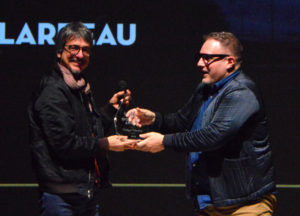Canadian Film Director Philipe Falardeau Receives Spotlight Award at WIFF
Canadian filmmaker Philipe Falardeau, the creator of internationally acclaimed hits like Monsieur Lazhar and The Good Lie, was presented the Spotlight Award at this year’s Windsor International Film Festival.
The presentation took place prior to the screening of his four-part documentary series Lac-Megantic: This Was Not an Accident at the Capitol Theatre. (Parts one and two were shown on Sat., Oct. 28 and three and four on Sun., Oct. 29.)
Lac-Megantic premiered earlier this year at Canada’s Hot Docs film festival winning the Audience Award. This docu-series is about the 2013 railcar disaster which set half of the small town in Quebec on fire. It was Canada’s worst non-passenger railroad accident. Much of the film focuses on the foreseen inactivity of the railways and regulatory agencies as well as the personal tragedies experienced by the town’s people.
Vincent Georgie, the executive director and chief programmer of WIFF, said Lac-Megantic is Falardeau’s masterpiece and sure to generate community discussion.
During the question-answer session before the screening of the film, both Georgie and Falardeau talked about many journalists going to Lac-Maegantic to cover it as a breaking news story.

Canadian Filmmaker Philipe Falardeau (left) receives the Spotlight Award from Windsor International Film Festival Executive Director and Chief Programmer Vincent Georgie (right) at the Capitol Theatre on Saturday, Oct. 29, 2023. Photo by Ken Pastushyn.
“I’m not a journalist,” said Faladeau. “I just picked up the pieces afterwards.”
What Faladeau did was give the townspeople enough time to reflect on their personal tragedies. Then he built a trust and friendship with them eventually coming back with the cameras to film their stories.
“You are a journalist,” assured Marty Beneteau, who was a journalist himself for 35 years ending his career as managing editor of the Windsor Star. Beneteau is also the chairman of WIFF.
During the Q & A period, Beneteau stood up from the audience and asked, “how do you control your anger?”
“It’s tough,” said Faladeau. “Even though it becomes a bit more journalistic, I try to bring back those human voices.”
Faladeau’s approach is to do it in a cinematic way by building suspense and tension telling stories through the voices of the people. It’s much like the way Alfred Hitchcock does it.
The reaction to the film was split. The townspeople started to get together and talk to one another making the healing process a bit easier. The politicians basically ignored the documentary.
Falardeau reflected on one former minister of transportation saying the film could have been more constructive.
“I say it’s your job to be constructive and my job to raise red flags,” said Faladeau to the audience.
And Georgie’s final question to Falardeau before the screening of the film: “What do you want our community to take away from this film?”
“It’s a ticking time-bomb and it can happen anywhere in Canada,” said Falardeau.
It really could happen here as well as in other industries. A scene in the film shows the route of railcars transporting crude oil from North Dakota’s fracking operation along the Minneapolis to Chicago and Detroit corridor through Windsor on the way to Toronto.
“Did we care to notice that we were carrying more and more crude oil,” asked David Seglins, a CBC News investigative journalist in one scene. “It didn’t seem to be an issue until it exploded.”
And in the end, the local politicians and emergency responders were left with a problem that no one could handle.
“You can tell who the locals were because they were walking around lke someone hit them on the head with a baseball bat,” said Ian Willms, a freelance photojournalist who has covered more than his share of fires. “I’ve never seen anything burn like this.”


